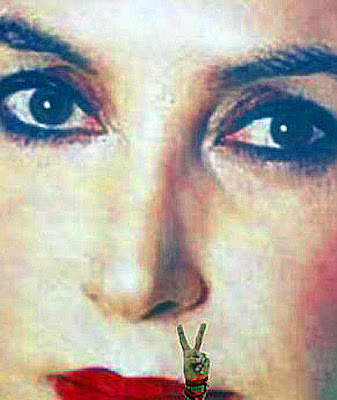BHUTTO KILLED IN BOMB ATTACK
by Speigel Online

A suicide blast in Rawalpindi has claimed the life of Pakistani opposition leader Benazir Bhutto and an estimated 20 others.
A gun and suicide bomb attack killed Pakistani opposition leader Benazir Bhutto and an estimated 20 others Thursday during a campaign rally in the city of Rawalpindi.
Bhutto died at Rawalpindi General Hospital shortly after 6 p.m. local time where she was being treated for injuries sustained in the attack, according to a member of Bhutto's political party. A senior military official confirmed her death to the Associated Press.
Supporters outside the hospital chanted "Dog, Musharraf, dog," referring to Pakistani President Pervez Musharraf, according to the AP.
The blast occured as Bhutto was leaving a political rally in which she urged thousands of supporters to canvas votes before parliamentary elections to be held Jan. 8. The AP quotes party security advisers as saying that the suicide bomber shot Bhutto in the neck and chest as she got into her vehicle before triggering the bomb.
"She has been martyred," Bhutto's security advisor, Rehman Malik, told Reuters.
"We repeatedly informed the government to provide her proper security and appropriate equipment including jammers, but they paid no heed to our requests," Malik told the AP.
Fellow former premier and rival opposition leader Nawaz Sharif came to the hospital and sat next to Bhutto's body. "Benazir Bhutto was also my sister, and I will be with you to take the revenge for her death," Sharif told a crown gathered outside the hospital. "Don't feel alone. I am with you. We will take the revenge on the rulers."
Bhutto served as Pakistan's prime minister two times between 1988 and 1996. She was the first woman elected prime minister in the Muslim world.
On Oct. 18, Bhutto returned to Pakistan after eight years in exile, only to escape a suicide bombing (more...)at her homecoming parade in Karachi, which killed more than 140 people. But she nonetheless continued campaigning in the hopes of becoming Pakistan's prime minister for a third term.
Bhutto was allowed to return to Pakistan after making a deal with Musharraf brokered over two secret meetings in Dubai last summer. Musharraf had charges of corruption against Bhutto lifted and allowed her to return to Pakistan in return for her supporting his re-election as president.
Musharraf has been sharply criticized for his failure to stem Islamic extremism. He also sparked extended, violent protests after he suspended the Supreme Court's chief justice in March. The justice was reinstated in July.
But it was Musharraf's firing of the Supreme Court in early November and his imposition of a state of emergency that ushered in the most recent political crisis in Pakistan. Many saw the move as an effort to retain both his position as president and as army chief of staff, a state of affairs in violation of the Pakistani constitution. Bhutto did not shy away from criticizing Musharraf's apparent power grab and he resigned from his military duties at the end of November.
Bhutto's enemies included Taliban extremists and al-Qaida, who despised her for her support of the US-led fight against terrorism and pledged to send suicide bombers after her. She had even gone so far as to say that, if she were in power, she would allow US forces to attack al-Qaida targets in Pakistani territory.
The US had recently been trying to get Bhutto and Musharraf to cooperate in stabilizing the country. A $300 million (€206.6 million) aid package for Pakistan authorized by the US Congress on Wednesday requires that the country reach certain goals in its efforts to fight terrorism and ensure democratic reform.
Bhutto was expected to fair well in the January elections. Her violent death threatens to precipitate more chaos and mass protests and derail her efforts to secure free elections and a peaceful transition to civilian rule.











0 Comments:
Post a Comment
Subscribe to Post Comments [Atom]
<< Home